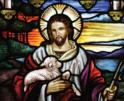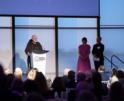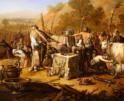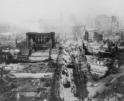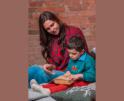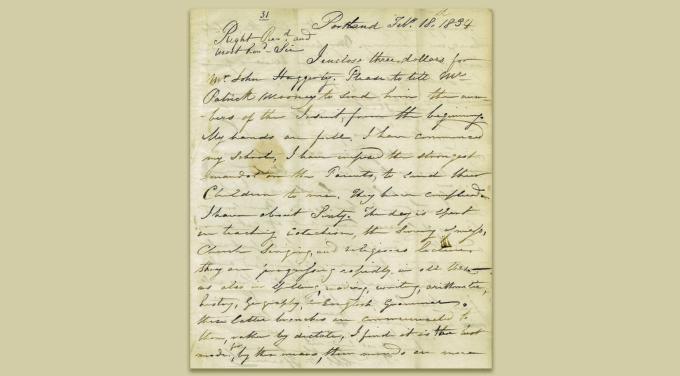
Culture

The "History of the Archdiocese of Boston" states, "to be charged with a mission extending from Eastport to Dover, and with the task of simultaneously building three churches under the given conditions, was a prospect that might have daunted even a bold priest.
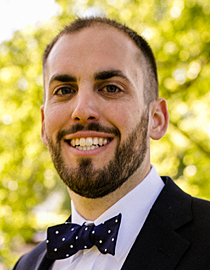
Lester
On Feb. 18, 1834, Father Charles Dominic Ffrench wrote to Bishop Benedict Fenwick of Boston about a school that he commenced in Portland, Maine. St. Dominic Church in that city served as the base for this priest who, in eight short years, had helped lay foundations for several Catholic communities within his extensive parish covering parts of Maine and New Hampshire.
Father Ffrench was a native of Galway, Ireland. Born in 1775 to a prominent Protestant family, his father was said to be a Protestant bishop; from an early age, he is believed to have been drawn to the Catholic faith and secretly attended Mass. By age 14, he began studying with a priest, and three years later, converted; in doing so, he effectively gave up the social status and wealth his family would have otherwise bestowed upon him.
He studied in Galway and then Lisbon, where he was ordained Dec. 21, 1799, as a member of the Order of the Preachers, better known as the Dominicans. By 1803, he was running a private school in Dublin, and, though the reason is unclear, he claimed betrayal by a trusted partner, and the school went bankrupt in 1808.
Part of his financial loss included money he was supposed to safeguard for a private individual, and his determination to pay this debt was said to weigh upon him for years, influencing his decision at the time to depart Europe for the United States, intending to minister to the growing Irish Catholic population while saving to repay his debts.
He sailed from Lisbon on May 15, 1812, but the following month war broke out between the United States and Great Britain, and his ship diverted to St. John, New Brunswick. Straying from his original plan, his services were accepted by Bishop Joseph-Octave Plessis, who assigned him a mission extending from St. John nearly 200 miles north to near Chaleur Bay.
Father Ffrench served the mission for the next five years before alleged misdeeds caused Bishop Plessis to revoke his faculties in June 1817. By the end of the year, he had traveled to New York, where he was accepted by Bishop John Connolly, also a Dominican, and assigned to St. Peter Church. Again, Father Ffrench's time in New York would only last about five years, as he sided with Bishop Connolly in a struggle against the lay trustees of the church, and as part of the attempts to restore harmony, both he and future Boston priest, Father William Taylor, were asked to leave in March 1822.
Father Ffrench returned to St. John, where he farmed and opened another school before accepting the invitation of Bishop Fenwick to come serve in the Diocese of Boston, arriving in the fall of 1826, and being assigned to a mission extending from Dover, New Hampshire, nearly 300 miles north to Eastport, Maine. The "History of the Archdiocese of Boston" states, "to be charged with a mission extending from Eastport to Dover, and with the task of simultaneously building three churches under the given conditions, was a prospect that might have daunted even a bold priest. But Father Ffrench had had an even vaster mission on his hands and more churches to build in New Brunswick; and he was not the kind of man to be daunted."
Within about a month of receiving his assignment, he made a complete circuit of the Catholics in his parish and returned to Boston, where he reported to Bishop Fenwick subscriptions to raise funds for churches in Dover and Portland had been commenced, and lots on which to build churches in Eastport and Saco had been purchased.
After spending the rest of 1827 in Boston raising money for the new churches, Father Ffrench returned to his parish, where church building was taking place at a relentless pace. He laid cornerstones in Eastport, Dover, and Portland in April, May, and June, and by the end of the year, all were complete enough to be used by their respective congregations.
This unwieldy parish was reduced in size when Dover was detached in 1830 and Eastport in 1834, but the tireless Father Ffrench found ways to keep himself busy in Portland. On Feb. 18, 1834, he wrote to Bishop Fenwick, stating that he had commenced a school, as he had previously done in Dublin and St. John.
He writes that "my hands are full." After urging parents to enroll their children, he had about 60 students, and his days were "spent in teaching catechism, the gospels, church singing, and religious lectures." The students were "progressing rapidly" in each of these subjects, as well as spelling, reading, writing, arithmetic, history, geography, and English grammar. For the latter subjects, he found that teaching by dictation was the most effective method, for the students "minds are more strongly impressed, and they hold the dictates longer in memory."
In addition to a thriving school, large numbers were attending Mass; he spent a lot of time administering the Sacrament of Reconciliation and giving lectures from the altar.
Father Ffrench remained in Portland until the fall of 1838, when he submitted his resignation to Bishop Fenwick, the time had finally come to return to Europe and repay the debt that had directed him towards the U.S. 26 years earlier.
In The Pilot of Oct. 20, 1838, he published a letter "To the Inhabitants of Boston . . . To tender his grateful acknowledgment to the inhabitants of Boston, for their kind and generous contributions towards building Catholic Churches at the principal posts, or towns, of his mission, amounting to $2926." It continues, the Catholics in Portland, Dover, and Eastport "will never forget your bounty -- to you they feel deeply indebted for the happiness they enjoy, in having Churches wherein the diving mysteries are celebrated."
Father Ffrench returned to the Diocese of Boston in 1846 and was sent to Lawrence, where he is considered the founder of the Catholic community. There, he opened the first church on land given to him by the Essex Company on Nov. 15, 1846.
Father Ffrench died on Jan. 5, 1851, in Lawrence. He had been ill for the two previous years. Clues indicate heart failure, and for several months had not been able to celebrate Mass. Bishop John Fitzpatrick, Bishop Fenwick's successor, traveled to Lawrence for his funeral and commented that "in the ministry he was remarkable for his zeal, energy, and enterprise and the piety of his conduct and regularity of life. His manners were most amiable and winning, his temper even and placid, his spirits buoyant and sprightly though seasoned with becoming gravity. Perhaps the most remarkable virtue of his virtues was the Charity which regulated at all times his conversation. He was never heard to speak ill of any person . . ."
The bishop's journal entry also reveals that it was with horror he learned upon arriving in Lawrence that Father Ffrench, at 350 pounds, had burst out of his coffin, which was too small. A second was built, but still not of adequate proportions, and so "the b(isho)p was obliged to order a large box of plain board" but after a two-hour wait for it to be completed, it was found to be too shallow to secure a lit on top, so a pall was spread over the top and he was transported to a cemetery in neighboring Methuen and laid to rest.
- Thomas Lester is the archivist of the Archdiocese of Boston.
Recent articles in the Culture & Events section
-
The example of the Good ShepherdMichael Reardon
-
Spring Celebration Gala will honor Cardinal O'MalleyShannon Lyons
-
Scripture Reflection for April 28, 2024, Fifth Sunday of EasterDeacon Greg Kandra
-
Boston and the nation respond to the San Francisco Earthquake of 1906Thomas Lester
-
See you in the storyLaura Kelly Fanucci

